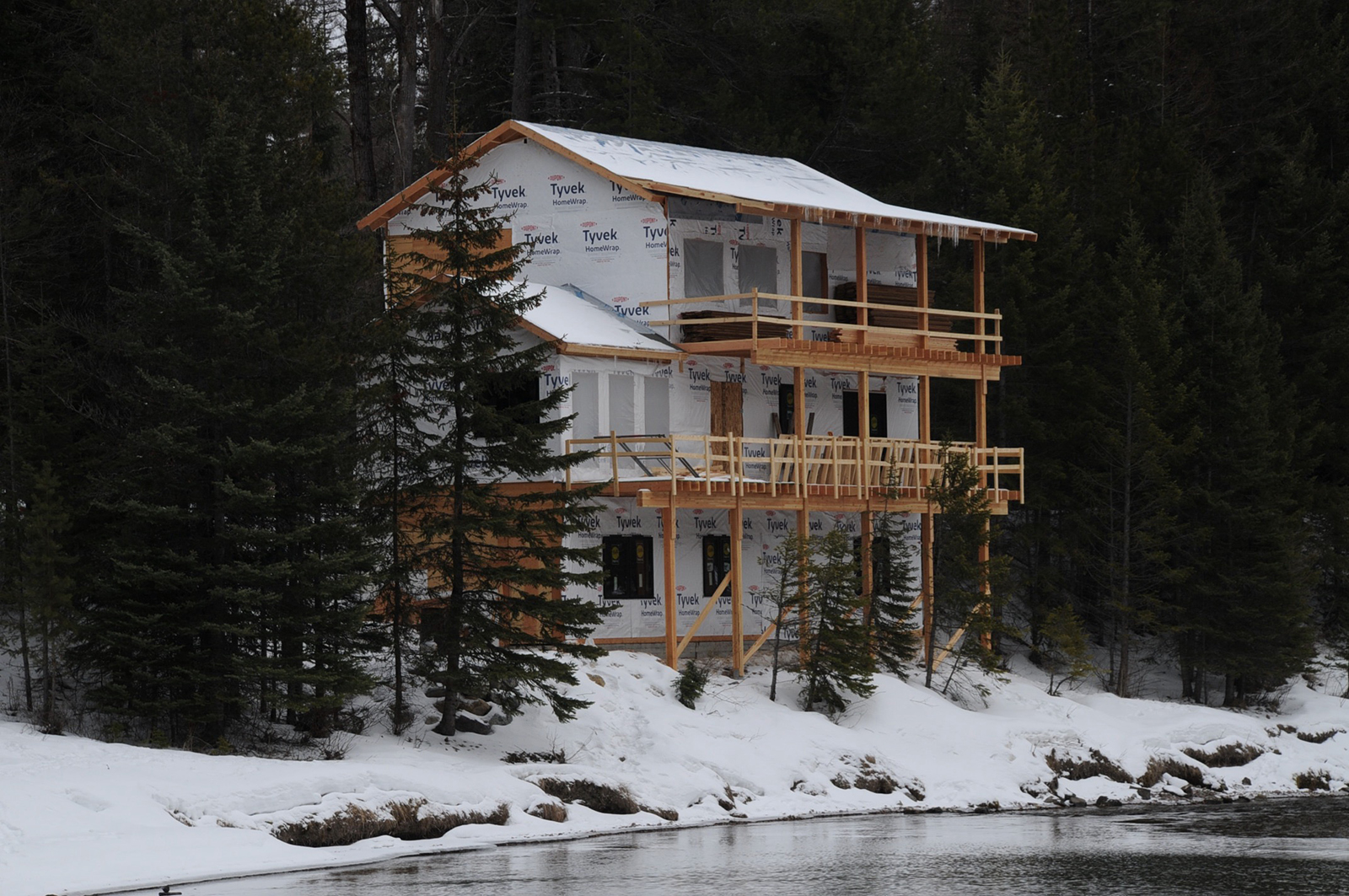Conservation District Appoints Hearing Officer in McDonald Creek Home Dispute
Laurie Zeller worked for the state Department of Natural Resources and Conservation for 40 years, retiring in 2020 as the agency’s Conservation District Bureau Chief
By Tristan Scott
The Flathead Conservation District’s Board of Supervisors on Wednesday afternoon appointed a hearing officer to arbitrate a dispute over whether a California couple building a three-story home on private property along the banks of Glacier National Park’s McDonald Creek is doing so in violation of Montana’s preeminent streambed law.
In a unanimous vote during a May 3 special meeting called by the Flathead Conservation District, the supervisors selected Laurie Zeller to preside over the declaratory ruling process, which could span up to eight months and is the first step toward determining whether the property owners must remove the unfinished structure. Zeller spent 40 years working for the Montana Department of Natural Resources and Conservation (DNRC), retiring in 2020 as the agency’s Conservation District Bureau Chief. In that role, she oversaw all manner of cases involving 310 permits, as well as violations of the Montana Natural Streambed and Land Preservation Act, which is the 1975 statute that property inholders John and Stacy Ambler are charged with violating.
“We have over the course of the last few weeks engaged with several potential candidates to serve as the hearing officer and we have landed on an individual who is extremely well qualified and that is Laurie Zeller,” said Samantha Tappenbeck, the Flathead Conservation District’s Resource Conservationist. “She spent more than 40 years dealing with conservation and 310 permit matters and would be extremely well qualified to take over the role as hearing officer in this matter.”
A 310 permit is named after the Montana Senate bill that led to the creation of the Natural Streambed and Land Preservation Act, commonly referred to as the 310 law. Under the statute, any private individual or entity proposing work in or near a stream that “physically alters or modifies the bed or immediate banks of a perennial-flowing stream” must first obtain an approved permit from the local conservation district.
The Amblers acknowledge they did not obtain an approved permit, but claim they took steps to ensure they were meeting all regulatory requirements prior to purchasing the 0.05-acre, 2,309-square-foot parcel in 2019.
“The Amblers contacted Flathead County in 2019 about building on their property and were advised in writing that no permits were needed. The Amblers notified Glacier National Park of their intent to build in 2021. Glacier National Park did not require any permits and authorized the Amblers to connect their residence to the Apgar Village water and sewer system,” the couple’s petition for a declaratory ruling states.
Still, the Amblers were found to be in violation of the 310 law at a public hearing on March 13, when the supervisors reviewed and discussed 17 complaints submitted by neighbors and nearby residents. Two weeks earlier, on Feb. 27, an onsite inspection of the house performed by the district’s supervisors, as well as a representative of Montana Fish, Wildlife and Parks, revealed that the couple’s house was indeed under construction and that the McDonald Creek streambank had been excavated to create a pad for the home’s construction.
To correct the violation, the supervisors ordered the Amblers to remove the structure before Nov. 1, and to restore and revegetate the damaged streambank. Not only must the work occur after high water, according to an order for corrective action, but a 310 permit must be obtained prior to beginning both the demolition work and the streambank restoration.
The Flathead Conservation District’s Board of Supervisors last month also approved a cease-and-desist order suspending further work on the home. Although the Amblers had already halted construction, the order places an enforceable moratorium on future work until the conclusion of the declaratory ruling process.
Central to the declaratory hearing is the Amblers’ right to submit for the hearing officer’s consideration any data and information in support of their petition, a right shared by members of the public.
John Ambler says his family has been visiting Glacier National Park for more than four decades, spending summers at a family cabin located at Kelly’s Camp on Lake McDonald, an historic district where a number of private “inholdings” pre-date the park’s creation.
The case is unfolding according to the Flathead Conservation District’s adopted rules for a declaratory ruling, with the Amblers represented by attorney Trent Baker, of Datsopoulos, MacDonald and Lind in Missoula.
Hailey Graf, the DNRC’s 310 permit officer for the state, said the declaratory ruling process can take between six to eight months and can generate an enormous workload for the appointed hearing officer. For that reason, Graf said it makes sense to choose someone who is either retired or already holds an administrative position that deals with stream permitting laws.
Tappenbeck said Zeller was the only candidate who accepted the Flathead Conservation District’s invitation to preside over the case.
“Everyone else politely declined,” Tappenbeck said.
If the Amblers are dissatisfied with the outcome of the declaratory ruling process, they may seek a judicial ruling in district court. If they are dissatisfied with the lower court’s determination, they may then seek judicial review by an appeal to the Montana Supreme Court within 60 days after entry of judgment in the district court.